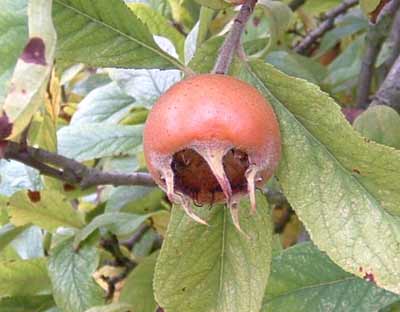A medlar is a fruit about the size of a small apple which is harvested when it is soft, squashy and brown - almost rotten, said to have originated in Persia. It is most often used in making a dark red jelly-like spiced condiment. We picked these apparently rotting fruit from the ground under a tree one August near Sarlat in France. It took some courage to squirt the ripened pulp out through the skin, but such a surprise to taste the sweet, custardy flesh. Alys Fowler describes the flavour as “sweet like a date, a hint of lemon and a little apricot.” The French call them "culs de chien" or "dog's arse", which is pretty descriptive.
Traditionally these were harvested late in the year while they were still hard and green and then left in soft, moist bran to 'blet'. Bletting was an expression coined by John Lindley in 1848. At this time medlars were a favourite in Britain but this popularity has declined with the problems of transporting essentially rotten fruit and the greater primness of most people towards food. Food is the new sex, not for the reasons most people cite, but for reasons of a desire not to know about the origins, the dirty dirty origins of most foods! This gorgeous fruit has fallen into disuse because of uncertainty about how to rot them to perfection. When ready, the fruit on the tree is dark brown, wrinkled and squidgy. Put them on a plate, bottom end down to ripen. To eat, peel the stalk end, hold the crown and squirt the juice out. They have lots of pips.
They can be used to make jellies and jams. And here is a great idea from Alys Fowler: bake them with white wine, dark sugar and vanilla, then purée them and serve with panna cotta or cream.
DH Lawrence, who was also interested in figs, wrote:
I love you, rotten,
Delicious rottenness.
I love to suck you out from your skins
So brown and soft and coming suave,
So morbid, as the Italians say.
What a rare, powerful, reminiscent flavour
Comes out of your falling through the stages of decay:
Stream within stream.
Something of the same flavour as Syracusan muscat wine
Or vulgar Marsala.
Though even the word Marsala will smack of perciosity
Soon in the pussyfoot West.
What is it?
What is it in the grape turning raisin,
In the medlar, in the sorb-apple,
Wineskins of brown morbidity,
Autumnal excrementa;
What is it that reminds us of white gods?
Gods nude as blanched nut-kernels,
Strangely, half-sinisterly fragrant
As if with sweat,
And drenched with mystery.
Sorb-apples, medlars with dead crowns.
I say, wonderful are the hellish experiences,
Orphic, delicate
Dionysos of the Underworld.
A kiss, and a spasm of farewell, a moment's orgasm of rupture,
Then along the damp road alone, till the next turning.
And there, a new partner, a new parting, a new unfusing into twain
A new gasp of further isolation,
A new intoxication of loneliness, among decaying, frost-cold leaves.
Going down the strange lanes of hell, more and more intensely alone,
The fibres of the heart parting one after the other
And yet the soul continuing, naked-footed, ever more vividly embodied
Like a flame blown whiter and whiter
In a deeper and deeper darkness
Ever more exquisite, distilled in separation.
So, in the strange retorts of medlars and sorb-apples
The distilled essence of hell.
The exquisite odour of leave-taking.
Jamque vale!
Orpheus, and the winding, leaf-clogged, silent lanes of hell.
Each soul departing with its own isolation,
Strangest of all strange companions,
And best.
Medlars, sorb-apples,
More than sweet
Flux of autumn
Sucked out of your empty bladders
And sipped down, perhaps, with a sip of Marsala
So that the rambling, sky-dropped grape can add its savour to yours,
Orphic farewell, and farewell, and farewell
The ego sum of Dionysos
The sono io of perfect drunkeness
Intoxication of final loneliness.
